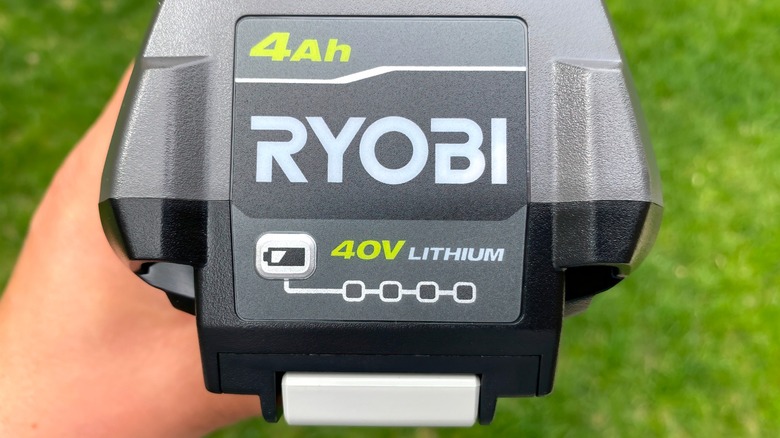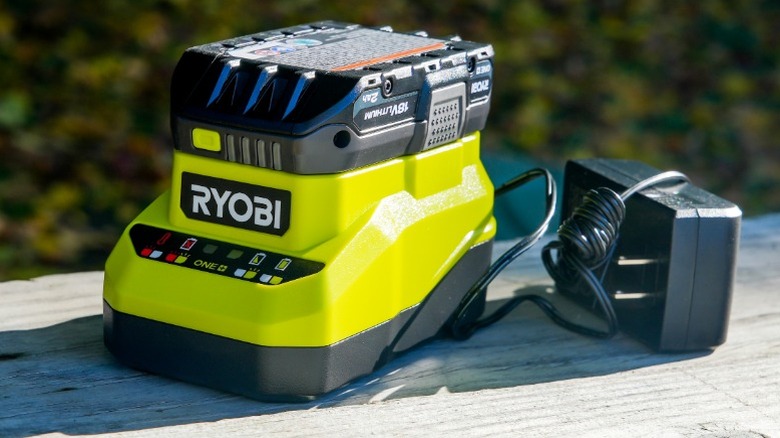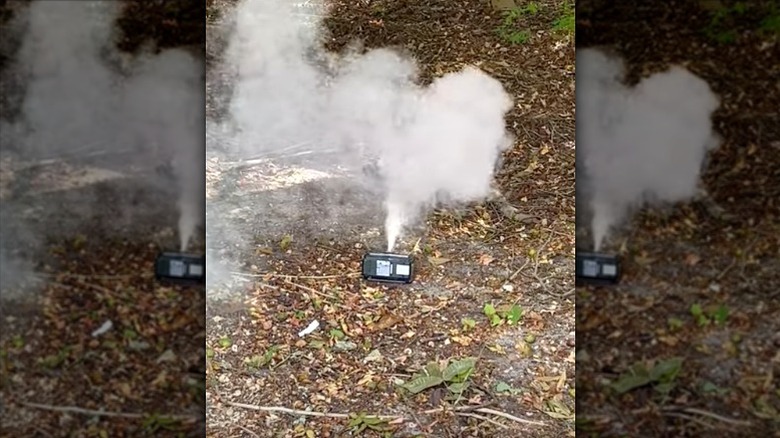Storage Tips To Prevent Your Ryobi Batteries From Exploding
Though it's rarely a top choice among professionals, Ryobi has carved out a comfortable niche as a go-to brand for casual DIYers. There are plenty of top-rated Ryobi tools and products for under $50 to fit the bill when you encounter a random household project. With its extensive lineup anchored by the versatile ONE+ battery system, the brand has earned a reputation for reliability. The last thing anyone would expect is for a battery to suddenly fail, much less blow up. And yet, that's exactly what happened to one unlucky Reddit user, u/lexacost, who awoke to a house fire in the making when a Ryobi battery spontaneously ignited. In a shared video, a white haze fills the garage as the camera eventually reaches a workbench with the melted 40V culprit sitting on it.
Unfortunately, it isn't the first time a Ryobi battery caused a fire. In 2024, for instance, WGME reported that a home in Maine suffered extensive damage after a leaf blower battery exploded in storage. But before you begin thinking this is a problem unique to Ryobi, it's important to take a broader look at lithium-ion batteries in general. Any battery can blow up if you don't use, charge, or store it properly. Damage from drops or punctures, liquid spills, overcharging, and extreme high or low temperatures compromises a battery's operation. Eventually, a fault can trigger a failure like thermal runaway. A chain reaction of overheating occurs, and the battery releases toxic gases and becomes at risk of catching fire or exploding. No battery is completely immune to a potential breakdown, but the way you treat it will significantly impact its safety.
Safe storage to keep Ryobi tool batteries from blowing up
Many of the ways you can ensure the longevity of your Ryobi batteries will also help you keep them from exploding. One of the most critical considerations is overcharging. Excessive charging can trigger overheating, as was the case during a 2023 Massachusetts fire, reported by WWLP, in which a Ryobi battery stayed on the block for over a week. Always monitor your batteries while charging, taking them off the block as soon as they're done. Ideally, you should only charge your battery to about 80% capacity. Set a timer, if needed, to help you stay on track.
While overcharging can generate excessive heat, too much discharging can similarly cause hazardous short circuits. In worst-case scenarios, the degradation can increase the chances of thermal runaway and a potential fire. To keep your batteries in the best possible condition, try to maintain a 40 to 50% charge during storage.
Mind the materials you store around your Ryobi batteries. Keep the batteries away from nails, cans, and other metal objects that can touch the terminals and cause a short. Flammable materials and items, such as furniture, carpeting, or clothing, should likewise sit far from batteries that are charging or in storage. Use a well-ventilated, cool, and dry place out of direct sunlight (the car or your garage may not be the best place for battery storage!). Lithium-ion power tool batteries do best in temperatures around 60 degrees Fahrenheit. Take the battery out of its tool, and store it in an upright position. If you have multiple Ryobi batteries, give them some space between one another.
How big of an issue is this?
Ryobi has been no stranger to battery issues since it introduced its first ONE+ 18V battery in the late 1990s. In 2013, the brand even experienced a recall on its 18V batteries due to an overheating issue during charging that would cause explosive fires. Of course, Ryobi made several strides since then, including the release of an HP Brushless series in 2020. And yet, users continue experiencing sporadic instances of battery explosions, fires, and personal injury.
So, does that mean Ryobi batteries are more dangerous than the next brand? While the horror stories can be off-putting, they also only represent a minor fraction of the countless Ryobi batteries out there. Smart storage and responsible use will give you long-lasting and safe performance, regardless of the tool brand. Beyond that, knowing what to look for can help you avoid any worry over your batteries exploding.
Check your battery regularly when it's in prolonged storage. Factors like the temperature, humidity, sunlight exposure, and discharge level can all impact the wear on a battery and its susceptibility to catching fire. Avoid charging if the battery is overly warm. Look for physical damage, like cracks or compression, that may have compromised the internal components. If you notice any bulging in the battery, popping or crackling sounds, or odd smells indicating gas venting, put the battery in a safe place away from the house, and contact the fire department.


